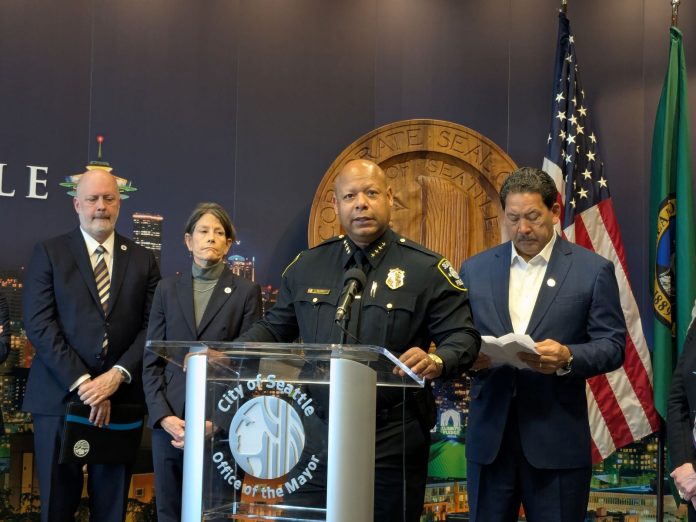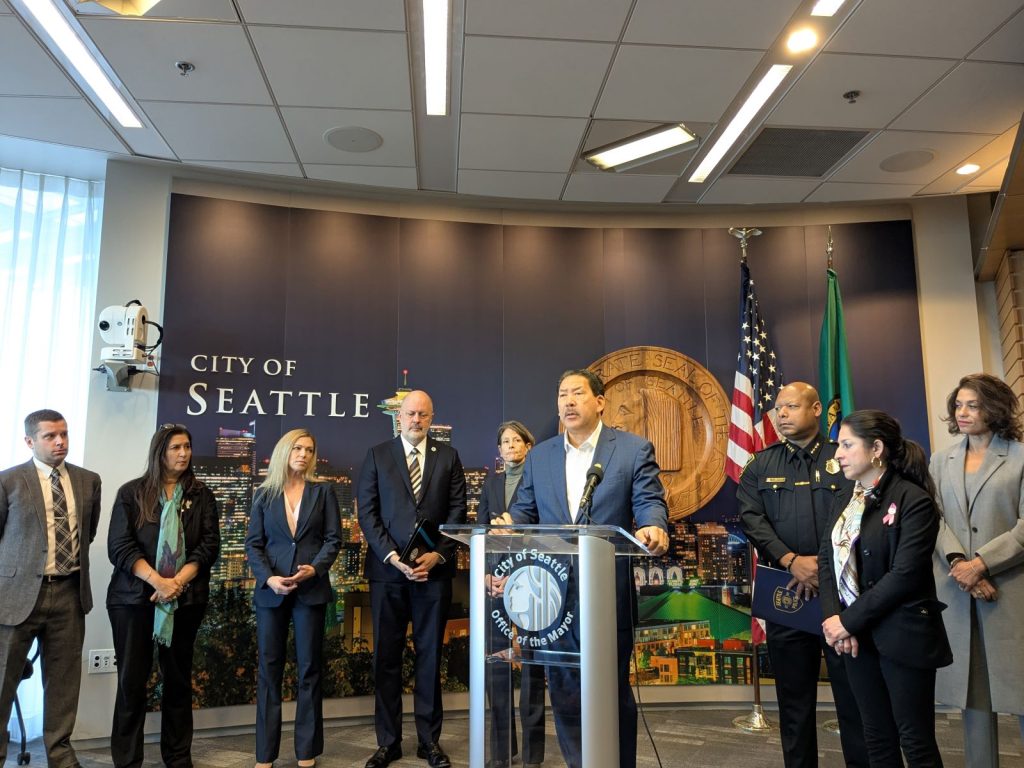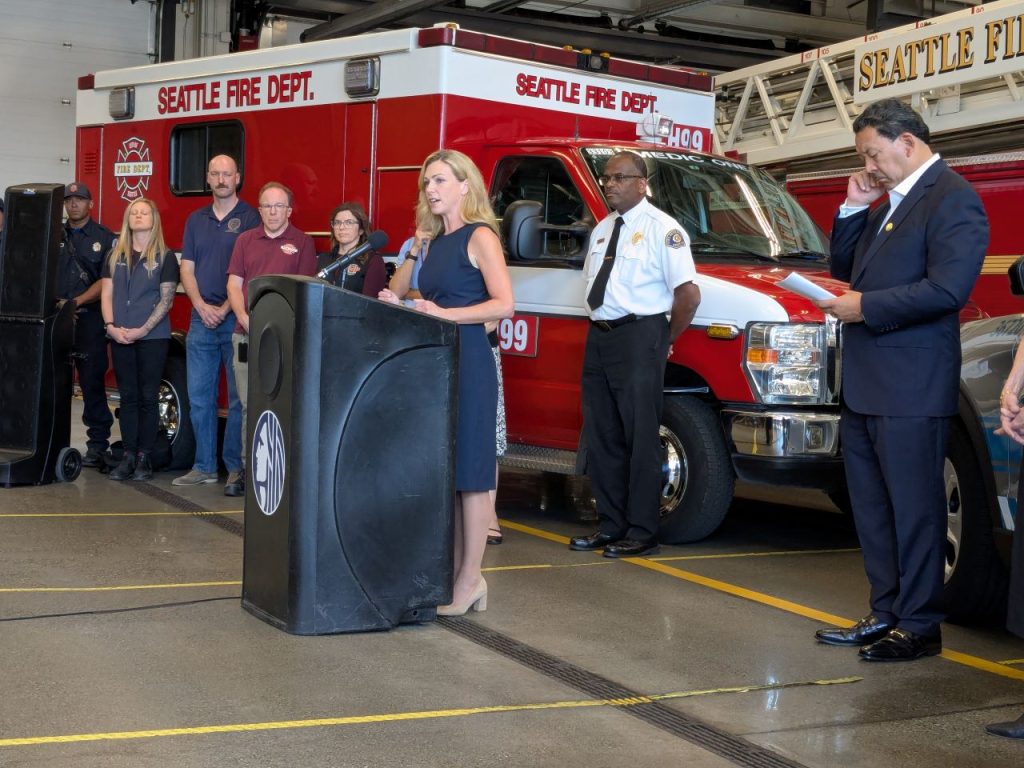
On Wednesday, Mayor Bruce Harrell announced his promised, newly negotiated Seattle Police Officers Guild (SPOG) contract, which governs the wages, working conditions, and accountability provisions for rank and file officers at the Seattle Police Department (SPD).
The new contract will once again significantly increase officer wages and bonuses while removing a few of the onerous restrictions that have been hampering the Community Assisted Response and Engagement (CARE) department — while adding other new obstacles. Coupled with the retroactive police contract Harrell negotiated in 2024, the new contract would represent a 42% raise over five years.
“We’ve reached a groundbreaking agreement with the rank and file police officers that fundamentally transforms how we deliver public safety in our city,” Harrell announced at a press event to celebrate the new contract.
However, as with the SPOG contract passed last year, accountability improvements have once again been given short shrift, with few tangible gains to show in return for concessions granted to SPOG at the bargaining table.
Perhaps most notably, the Office of Police Accountability (OPA) will no longer be handling cases of “less than serious” misconduct. Instead, these cases will be referred to an officer’s chain of command for one of two possible levels of investigation. The more serious level of investigation could result in discipline no more serious than a letter of reprimand, while the informal level of investigation won’t result in any discipline.
A succession of SPD chiefs, including Adrian Diaz, Sue Rahr, and current Chief Shon Barnes, have been asking for this change, saying it will result in increased leadership within the force. It is unclear this shift would increase accountability in practice.
For example, DivestSPD wrote that these “less than serious” cases of misconduct would include driving violations such as driving excessively fast in response to 911 calls, the situation in which SPD Officer Kevin Dave struck and killed Jaahnavi Kandula with his patrol car. Unless driving violations could be proven to be intentional or reckless, they wouldn’t fall under serious violations to be investigated by the OPA.
Another example of misconduct that might no longer go to the OPA is timecard “mistakes.” Logging extreme levels of overtime hours has allowed some SPD officers to double their base salary or more. For example, SPD paid Ron Morgan Willis $414,543 in 2019 after he claimed to have averaged about 80 hours per week for the year. That salary was possible even before Harrell era police pay raises.
Having police investigate themselves for less serious offenses will increase the potential for conflicts of interest, which is something accountability advocates have been trying to reduce for years. It might also reduce public transparency regarding misconduct that may be classified as minor but is still of public concern.
The Office of the Inspector General (OIG) will be able to audit these new internal processes, adding another body of work right when the agency is poised to take over more work due to the City’s exit from the consent decree.
Hefty price tag
Should the city council pass the SPOG contract, SPOG members will receive another significant raise. In 2021, a new SPD officer made $81,000. Under this new contract, a new officer will now make a base salary of $118,000, which will rise to $126,000 if the recruit lasts six months.

Last year’s contract raised member wages by a compounded 24%, covering 2021-2023. The total raise for SPOG members over the last five years will be 42%.
SPOG members will receive an additional 2.7% raise for 2026 and a 3-4% raise for 2027.
But that’s not all. SPOG members retain their 2% monthly pay bonus if they are required to wear body worn cameras on duty, a bonus that the Seattle Police Management Association (SPMA) already phased out at the beginning of 2023. And officers will now receive new education “premiums” should they have a Bachelor’s degree (4% premium), an Associate’s degree in various related fields (1.5% premium), or be able to demonstrate fluency in a language besides English (1.5% premium).
SPOG members also retain the special events bonus they won in the Memorandum of Understanding (MOU) that originally allowed the CARE team to begin its dual dispatch pilot. The amount is going up from $225 per special event shift to $250 at the beginning of 2026.
The City has also agreed to contribute to SPOG’s Benefit Trust, which provides medical care for retirees. The City will pay a $1000 per employee contribution to begin, as well as $100 per month per employee going forward.
While not covered in this contract, SPD recruits still receive a $7,500 hiring bonus, while lateral transfers can receive up to $50,000.
CARE alternative response remains hamstrung
With money allocated in his proposed budget to double the size of the current CARE team, Harrell signalled success in negotiations with SPOG to finally allow the CARE team to do their jobs unhampered. However, that promise is not fully realized in the actual contract.
The contract does allow CARE responders to be dispatched by themselves in certain circumstances. It doesn’t list specific call types, instead giving allowable scenarios, a change CARE Chief Amy Barden told The Urbanist she is pleased to see. The three included scenarios are a third-party report of someone having a behavioral health crisis, a request from an adult for food, shelter, or transportation, and a third-party report of someone who needs to be checked on for safety reasons, such as sleeping in the extreme cold.

However, while the CARE team has been made permanent and is now allowed to grow at will, the contract puts a number of serious restrictions on calls to which CARE can be solo dispatched without having to first wait for police to come.
Perhaps most limiting is the restriction that CARE can only respond to incidents that are in an “open public location” or “publicly owned building.” They are not allowed to respond by themselves to incidents in privately owned businesses, residences, apartment buildings, cars, or homeless encampments.
“I was adamant that the public private residence thing could not be a stipulation,” Barden told The Urbanist. “It needs to be the same as fire and EMS [emergency medical services].”
The car restriction is also problematic due to the number of people who need assistance who might live in their car or be inside a car in order to keep warm.
The contract also disallows the CARE team from answering calls by themselves when a potential crime has taken place such as public drug use or drug possession or where drug paraphernalia is present.
“It’s a far cry from the true autonomy that I want to have,” Barden said.
This contract allows law enforcement in Seattle to continue to direct the work of 911, rather than institute a truly independent dispatch that understands the bodies of work of all first responders and can act accordingly. Barden has been insistent that dispatch independence is needed to reduce call response times across the city.
That independence, along with the promise of faster response, is still sadly lacking. In a salient example, per the contract, SPD sergeants have the power to override dispatch on the question of whether CARE team members are allowed to go to any given call.
SPD Chief Shon Barnes, meanwhile, appeared to misunderstand the model of the current CARE team and the extent to which his department has aided its expansion.
“I came to Seattle from Madison. We had a fully supported and staffed CARE team with the ability to do so with dispatch,” Barnes said at the press event. “So that’s not anything new to me. We certainly support that.”
However, the Madison program is run through its fire department and is more similar to Seattle’s Health One program than Seattle’s CARE responders. Health One embeds case managers with fire department paramedics to provide alternate response. And throughout Barnes’s tenure at SPD, SPD officers have been undermining the CARE program, with The Seattle Times reporting that CARE leadership has observed “a pattern of subversion.”
This observation concurs with The Urbanist’s reporting on a sudden and precipitous drop of CARE/SPD co-response in October 2024, right after SPOG members encountered problems with the City’s new payroll system.
Barden had not yet been shown the new SPOG contract before the press event, even though she had been asked to speak. Even so, she spoke of other possibilities for utilizing the CARE team, including a new partnership with the King County Prosecuting Attorney’s Office for the CARE team to be sent proactively to help people being released from the King County Jail. The CARE team is also developing partnerships with hospitals and might be able to be dispatched through 988 in the future.
“We need to do better, and we need to demand better,” Barden said at the event. “‘That is how it has been done’ is unacceptable. The status quo is unacceptable. The historic pace and process of bureaucracy is unacceptable.”
It seems likely Barden will be making the same pleas to elevate dispatch and use her alternative response team wisely for the next two years, the duration of the new SPOG contract, which runs through the end of 2027.
Accountability remains ignored
The new contract makes few gains on the accountability front.
As of the end of the day on Wednesday, the Community Police Commission (CPC), one of the three accountability bodies in Seattle, had not received a copy of the contract to review.
“We hope to see the accountability provisions outlined in the City’s Accountability Ordinance (Ordinance 125315) fully included in this contract, and that SPOG leadership can no longer hold a veto over police accountability,” CPC Executive Director Eci Ameh wrote to The Urbanist. “SPD has long stated its commitment to being a learning organization, accountable to the people it serves. This agreement is a critical opportunity to demonstrate that commitment by learning from communities most impacted by policing and inviting their voices and solutions into this critical process.”
Unfortunately, the new contract does not fully include the accountability provisions in the 2017 Accountability Ordinance.
Chief among Harrell’s touted gains is bringing the 180-day investigation clock into line with the ordinance. However, in the eight years since that ordinance was passed, thinking around the 180-clock has evolved. In December 2023, the federal Court Monitor overseeing Seattle’s consent decree recommended removing the clock altogether, calling it “ultimately an arbitrary deadline that has the potential to allow an officer who has committed serious misconduct to remain as a member of the SPD, even after a sustained finding.”
One of the most important accountability provisions that the 2017 Accountability Ordinance mandated, but which has never been implemented due to the SPOG contract, is subpoena power for both the OPA and the OIG. This issue was not addressed in the new contract.
The OPA was also meant to be able to hire as many civilian investigators as they deem necessary instead of being capped at four.
The new contract does allow OPA’s four civilian investigators (expanded from two to four in last year’s contract) to assist in misconduct cases that could result in termination, but one of OPA’s SPD officers must still be the lead or co-lead on any such investigations. These officers rotate into their OPA assignments for two to three years, after which time they return to non-accountability-related positions within SPD.
In a small improvement, OPA files will now be retained for a longer period (10 years) that will no longer be determined by the findings in the cases. Before, an OPA case without sustained findings was deleted after three years.
Most significantly, the City has finally determined to enter into interest arbitration regarding the issue of arbitration used to appeal disciplinary decisions. The City would like to institute a disciplinary review system for SPOG members like they have for SPMA members. The Mayor’s Office Chief of Staff Andrew Myerberg announced that the City and SPOG have “reached an impasse” on this issue.
“I think it’s really important to note that as part of our bargain, we were not willing to compromise these accountability provisions,” Myerberg said.
The most significant reforms that the City is seeking through interest arbitration are:
- Changing the burden of proof for proving an officer violated policy to be preponderance of evidence, which will make this proof easier;
- Forbidding de novo review and imposing a “no gotcha” rule, which would mean officers couldn’t bring forward new experts and evidence before an arbitrator, and the arbitrator would be limited to the record available to the police chief before the original disciplinary decision was made;
- An arbitrary and capricious standard required to overturn discipline imposed by the Chief.
The interest arbitration on these issues is scheduled to begin in 2026, and whatever decision the independent arbitrator reaches will be binding for both parties.
Next steps for the new SPOG contract
The SPOG contract was ratified by SPOG membership this past weekend. All that remains for it to become official is a vote by the city council.
Currently embroiled in budget season, the city council may opt to wait until after the final 2026 budget is scheduled to be approved on November 21 before taking up the SPOG contract vote. This short delay might mean that the new District 2 councilmember, either Eddie Lin or Adonis Ducksworth, will receive the opportunity to vote on the contract with their new colleagues.
Usually passage of SPOG contracts by council is considered to be a done deal before the official vote since a majority of councilmembers sit on the Labor Relations Policy Committee, which has already approved the contract.
Because the contract runs through the end of 2027 and SPOG contracts tend to take a long time to negotiate, it’s possible there won’t be another chance at a new contract during the next mayoral term, whether that position is filled by Harrell or frontrunner Katie Wilson.
This timing spells good news for SPOG, who would almost certainly prefer to avoid negotiations with a more progressive Wilson, should she end up winning the mayoral race. On the other hand, it is bad news for the CARE team and its boosters, who could face several more years of obstacles before Seattle’s alternative response might be allowed to operate as designed.
Amy Sundberg is the publisher of Notes from the Emerald City, a weekly newsletter on Seattle politics and policy with a particular focus on public safety, police accountability, and the criminal legal system. She also writes science fiction, fantasy, and horror novels. She is particularly fond of Seattle’s parks, where she can often be found walking her little dog.

